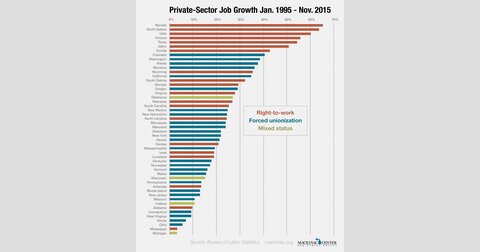Right-to-Work States Enjoying Faster Job Growth
Establishing a right-to-work law, by which employees in unionized workplaces can opt out of paying union fees without being fired, has become a familiar topic in state legislatures in recent years. With West Virginia legislators considering their own right-to-work law this month and similar laws under serious discussion in Kentucky, Missouri, and elsewhere, a question arises: What is the effect of right-to-work on the creation of new jobs?
From January 1995 through October 2015, the seven states with the highest private sector job growth were all right-to-work.
- Nevada: 66.4%
- North Dakota: 65.0%
- Utah: 59.8%
- Arizona: 54.6%
- Texas: 54.1%
- Idaho: 49.9%
- Florida: 42.2%
During the same period, four of the seven states with the lowest private sector job growth were forced unionization states.
- Michigan: 2.9%
- Mississippi: 3.2%
- Ohio: 5.6%
- Illinois: 7.2%
- Connecticut: 8.9%
- Alabama: 9.0%
- West Virginia: 9.2%
Ohio, Illinois, Connecticut, and West Virginia are all forced-unionization states, as was Michigan until March 2013.
Since Michigan’s right-to-work law took effect, its job growth ranks 16th of the 50 states.
Before the recent spate of right-to-work laws — Indiana became a right-to-work state in 2012 and Wisconsin adopted right-to-work in 2015 — the last state to implement right-to-work was Oklahoma in September 2001.
Oklahoma’s private sector job growth from September 2001 to October 2015 ranked 23rd of the 50 states, and Indiana’s job growth ranks 21st since Indiana’s right-to-work law took effect in March 2012.
Based on the most recent numbers from the U.S. Bureau of Labor Statistics, the four states with the fastest private sector job growth during the first 10 months of 2015 were Idaho, Nevada, Utah, and Florida, all with a right-to-work law.
Although letting workers choose whether to pay unions is just one policy in a long list of variables affecting job creation, right-to-work states continue to top the charts for private sector job growth.
Michigan Capitol Confidential is the news source produced by the Mackinac Center for Public Policy. Michigan Capitol Confidential reports with a free-market news perspective.


 Data counter Whitmer’s claim of growing Michigan
Data counter Whitmer’s claim of growing Michigan
 Michigan ranks 15th in job growth as national employment stalls
Michigan ranks 15th in job growth as national employment stalls
 Sen. Stabenow boasts about job growth that mostly reflects recovery from COVID-19 and pandemic policies
Sen. Stabenow boasts about job growth that mostly reflects recovery from COVID-19 and pandemic policies